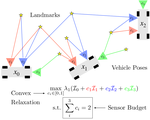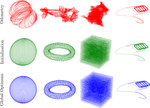I am an Assistant Professor in the Departments of Electrical & Computer Engineering (ECE) and Mathematics and the Khoury College of Computer Sciences (by courtesy) at Northeastern University, where I lead the Robust Autonomy Lab.
I am broadly interested in the mathematical and algorithmic foundations of trustworthy autonomy. My research applies analytical and computational tools from nonlinear optimization, differential geometry and topology, abstract algebra, and probability and statistics to design principled, computationally efficient, and provably robust algorithms for machine learning, perception, and control.
A major focus of my research is the design of practical estimation and control algorithms for nonlinear systems that provide explicit performance guarantees in real-world operation. To that end, much of my recent work has explored the use of convex relaxation as a general strategy for recovering provably-good approximate solutions to hard computational problems in artificial intelligence. Check out our recent survey article if you’d like to know more!
Interests
- Robotics
- Computer vision
- Machine learning
- Optimization
- Geometry and topology
- Probability and statistics
Education
-
ScD Computer Science, 2016
Massachusetts Institute of Technology
-
MA Mathematics, 2010
University of Texas at Austin
-
BS Mathematics, 2008
California Institute of Technology






